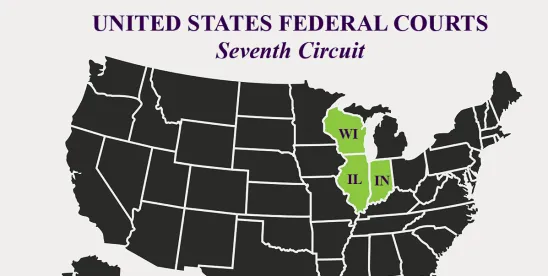The US Court of Appeals for the Seventh Circuit stayed a district court’s contempt sanctions relating to an anti-suit injunction violation, finding that the adjudicated infringer had done all it could to withdraw from the other proceeding in China. Motorola Solutions, Inc. v. Hytera Communications Ltd., Case No. 24-1531 (7th Cir. Apr. 16, 2024) (Hamilton, Brennan, St. Eve., JJ.) (per curiam).
Motorola Solutions previously obtained a $500 million judgment against Hytera for trade secret misappropriation and infringement of copyrighted code used in Motorola’s two-way radio systems. Motorola subsequently brought contempt proceedings after Hytera launched a new line of two-way radio systems, asserting that the new radio systems also used the copyrighted code. As part of the contempt proceeding, the district court imposed an anti-suit injunction ordering Hytera to “refrain from further pursuing or enforcing in any way” a lawsuit that Hytera had filed in the Shenzhen Intermediate People’s Court in China seeking a declaratory judgment that the new line of radios did not infringe Motorola’s intellectual property.
After evidence emerged that Hytera continued to participate in the Chinese proceeding, the district court issued an order directing Hytera to withdraw from the Chinese proceeding. Just a few days later the district court issued an order finding that Hytera had violated the anti-suit injunction by continuing to participate in the Chinese proceeding and imposed contempt sanctions, including a worldwide suspension of Hytera’s sales of two-way radio products; a fine of $1 million per day; and worldwide notice of the sanctions and prohibitions to customers, distributors and others. A few days after the order issued, Hytera filed an appeal.
At the same time, Hytera filed a petition with the Chinese court seeking to withdraw the declaratory judgment action and seeking the return of all evidence from that court. Less than a week later, Motorola appeared before the Chinese court. Because of the anti-suit injunction, Hytera did not appear at the hearing. At the hearing, the Chinese court denied Hytera’s motion to withdraw. Later that same afternoon, the Chinese court summoned Hytera and thereafter issued a short order granting the motion to withdraw.
Despite the Chinese court’s decision to grant Hytera’s motion to withdraw, the district court did not lift the sanctions. The district court expressed concern about a scenario in which a written order “technically withdraws the action” but comes with “a whole series of other consequences that generates duplicative litigation . . . and thereby undermines the whole purpose of the anti-suit injunction and the subsequent contempt proceedings.” The district court also noted that Hytera had not yet produced a promised log of ex parte communications between it and the Chinese court, and thus the district court could not be sure that Hytera was not using the Chinese court’s ex parte procedure to push for a favorable written order behind closed doors. Under the pressure of the continued contempt sanctions, Hytera repeatedly asked the Chinese court to clarify the status and effect of the order granting its withdrawal.
On appeal before the Seventh Circuit, Hytera argued that the contempt sanctions should be stayed because it had fulfilled the district court’s original anti-suit injunction by withdrawing from the Chinese action, and that it was unable to comply with the district court’s latest requirements to secure additional clarification or a final written order from the Chinese court.
The Seventh Circuit began by noting that it understood the district court’s skepticism that Hytera had complied with the district court’s order given Hytera’s long history of trade secret theft, spoliation of evidence and other litigation misconduct, and its initial delay in response to the anti-suit injunction. Nevertheless, the Court found the situation different here because Hytera lacked the ability to comply, and continued imposition of sanctions would be punitive. The Court explained that the Chinese court permitted Hytera to withdraw and Hytera could not be blamed for the Chinese court not providing any additional response, particularly when Hytera was precluded from having further communications with the Chinese court. The Seventh Circuit also explained that it appreciated the district court’s concern about ex parte communications with the Chinese court, but that even if the Chinese court reopened the action, Hytera would be prevented from participating without violating the anti-suit injunction. Accordingly, the Seventh Circuit stayed the contempt sanctions.
The Seventh Circuit commended the district court’s close attention to the case, noting that if Hytera should seek to take advantage of a future written order from the Chinese proceeding, the district court could take appropriate action to enforce its injunctions.




 />i
/>i

